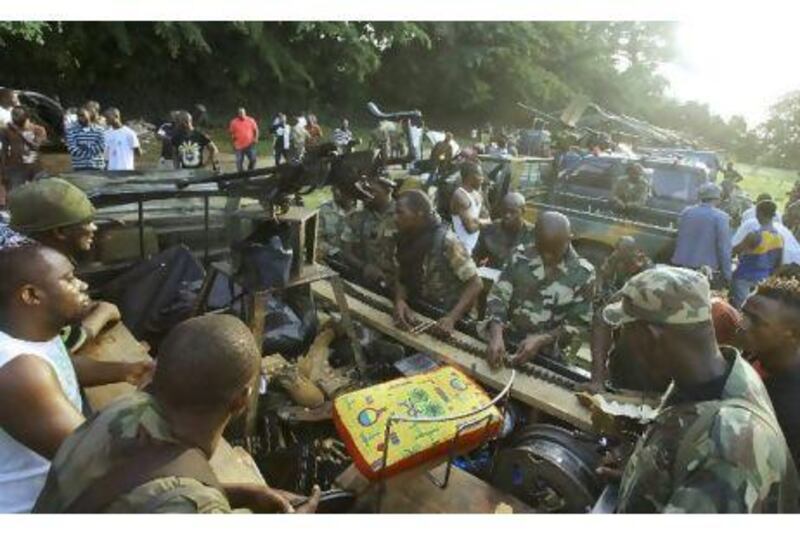ABIDJAN // Ivory Coast's president-in-waiting, Alassane Ouattara, waging an offensive in Abidjan, with world opinion behind him, is suddenly facing accusations of massacres by his army in the country's west.
Mr Ouattara, 69, the country's former prime minister, was elected president in November but prevented from taking office while the strongman Laurent Gbagbo stubbornly refuses to leave. He launched an all-out offensive to seize control of the country last Monday. Mr Ouattara yesterday rejected UN charges that his forces have been involved in mass killings of civilians.
In a lightning sweep south by his fighters to reach Abidjan, the economic capital of Ivory Coast and the last stronghold of his rival, one of the fiercest battles was for Duekoue, a town at a strategic crossroads in the troubled west.
The town fell on Tuesday into the hands of Mr Ouattara's Republican Forces army, and by the time the battle for Abidjan was in full swing on Friday, reports had emerged of a shocking massacre in Duekoue.
The International Committee of the Red Cross (ICRC) said the inter-ethnic violence was "particularly shocking by its size and brutality".
An ICRC spokeswoman in Geneva, Dorothea Krimitsas, said: "At least 800 people were killed in Duekoue on Tuesday," saying that information on the deaths had been gathered by Red Cross representatives who visited the area.
"There is no doubt that something on a large scale took place in this city, on which the ICRC is continuing to gather information," she said, adding that the agency's representatives had "themselves seen a very large number of bodies".
On Saturday, the UN Mission in Ivory Coast, which recognises Mr Ouattara as president and is providing protection for him, said its initial estimate was that 330 people had been killed.
Mr Ouattara's forces were accused of being the main perpetrators.
"330 people were killed between Monday and Wednesday. The majority were executed by 'Dozos'," said Guillaume N'Gefa from the UN mission's human-rights division, referring to traditional hunters fighting in Mr Ouattara's army.
At the same time, he said "over 100 people were killed by pro-Gbagbo mercenaries".
The Catholic charity Caritas later said that 1,000 people had been killed or "disappeared" in Duekoue, where mass graves were reportedly found after heavy fighting.
The International Federation of Human Rights "confirmed the existence of massacres in the town of Duekoue" but said the toll corresponded to the four previous months.
"We have regular feedback from our sources that executions continue," said an official with the organisation's Africa office, Florent Geel.
Mr Ouattara's camp insisted over the weekend they had killed "militia and not civilians".
"Militiamen are not civilians. From the moment they are armed, they are considered combatants. We must avoid all confusion," said Seydou Ouattara, a spokesman for the Republican Forces.
He also sought to distance the Republican Forces from the Dozos, saying they "are not members of the Republican Forces, but sympathisers".
Mr Ouattara's spokeswoman, Anne Ouloto, said: "Laurent Gbagbo had more than 800 Liberian mercenaries and militia."
These Gbagbo fighters have been accused of atrocities in the region, known as the Far West, throughout the four-month post-election crisis.
Rinaldo Depagne, a West African analyst at the International Crisis Group, said the report from the region "doesn't surprise me at all, it is a tumultuous region which has become used to violence".
The region, infected by Liberia's civil war from 1989 to 2003, with refugees streaming into the country, became a sourcing ground for mercenaries by both Mr Gbagbo and the rebels making up the Republican Forces during the conflict in the country in 2002 and 2003.
This fighting left the country split in two, with Mr Gbagbo maintaining control of the south while the rebels took the north.
In the cocoa-rich west a volatile mix of indigenous Guere (allegedly pro-Gbagbo), and northern Ivorians and a large population of West Africans, considered pro-Ouattara, has created a backdrop for land disputes.
For Mr Ouattara, the political results of the accusations could seriously tarnish his credibility, Mr Depagne said.
"It is not good for him at all, he has been elected democratically and he wears the suit of both a democratic man and one used to the Western world, who worked for the IMF [International Monetary Fund]. Suddenly this suit is dirty."





